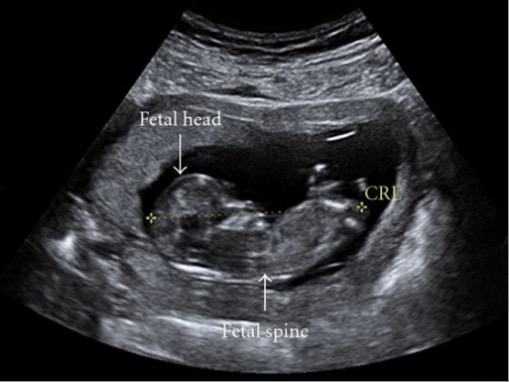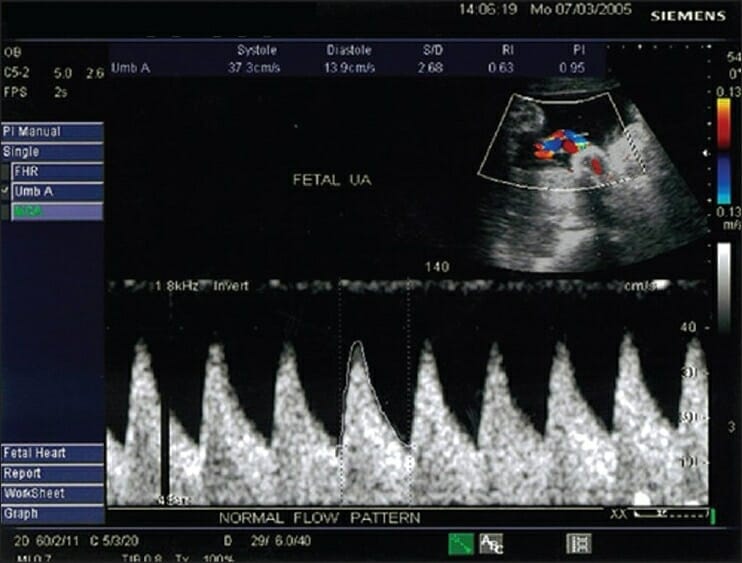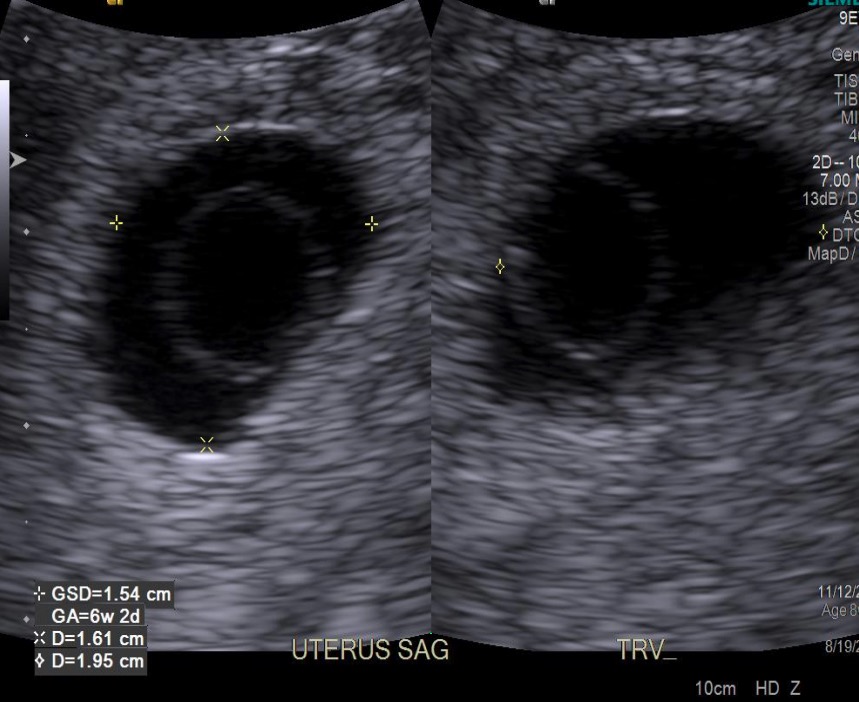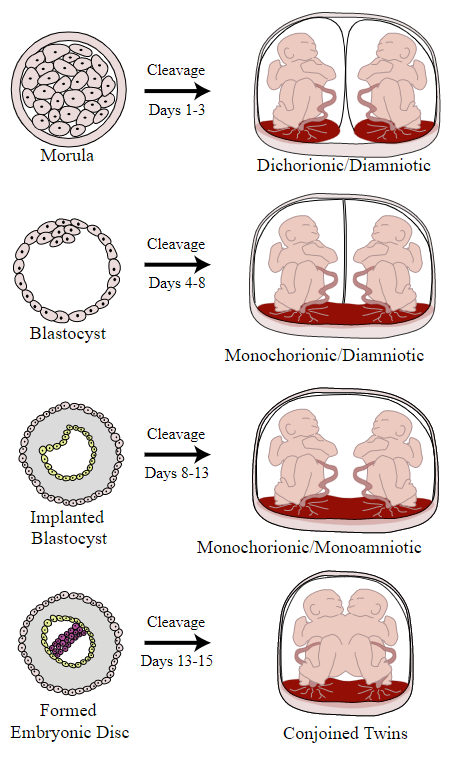Playlist
Show Playlist
Hide Playlist
Antenatal Care: Confirming and Dating Pregnancy
-
Slides RoutineCare Obstetrics.pdf
-
Download Lecture Overview
00:01 Let's now talk about confirming and dating pregnancy. 00:05 So here's a case. 00:07 A 19 year old presents to the emergency room with complaint of nausea,vomiting and right lower quadrant pain. 00:13 She states the pain has becoming increasingly worse over the last 12 hours. 00:18 She has no medical problems and no surgical history. 00:21 She has never been pregnant. 00:23 Her last menstrual period was 10 weeks ago. 00:25 But she reports cycles are irregular. 00:28 On physical exam her vital signs are stable and she is afebrile. 00:32 She is tender in the right lower quadrant on abdominal exam. 00:36 On pelvic exam, there is no cervical motion tenderness but she has fullness and tenderness in the lower right quadrant. 00:45 What is the next best step in her management? A. Ultrasound B. Urinary analysis. 00:51 C. Urine pregnancy test. 00:53 or D. Serum pregnancy test. 00:56 Let's go through the lecture to figure out what the answer is. 00:58 So there are several ways that we can confirm pregnancy and we can establish gestational age. 01:05 We're going to talk about each of these and talk about the risks and the benefits and why one test is better than the other. 01:12 So first of all let's talk about last menstrual period. 01:15 If we know a patient's last menstrual period and cycles are regular, we can't determine the gestational age. 01:21 And we use something called Naegele's rule. 01:24 So what we do is we take the last menstrual period subtract 3 months and we add 7 days. 01:30 So if a patient tells us her last menstrual period is April 1st, we subtract 3 months, giving as January at 7 days giving as the 8th. 01:41 And we would know that her due date is January the 8th. 01:44 Okay, again this is based on an accurate last menstrual period. 01:47 We can also confirm pregnancy through a urine pregnancy test. 01:52 Now the urine pregnancy test is a qualitative test. 01:56 That means that it either tells that the patient is pregnant or the patient is not pregnant. 02:02 So there are some benefits to that and that we can tell the patient such is in our case that we discuss when we're trying to figure out what may be a differential diagnosis. 02:10 But this does not tell us how far along the pregnancy is. 02:13 Next is the serum pregnancy test. 02:17 Now this is a quantitative test. 02:19 So this tells us exactly how much beta-hcg is in the blood. 02:23 Different than the urine pregnancy test if we remember, that one is qualitative so just as the patient is pregnant or the patient is not pregnant. 02:31 With that serum test, because we can determine the amount of hcg, we can use that to help us with our ultrasound to determine if we should or should not see something in the uterus to help establish gestational age. 02:44 When the beta-hcg is at least 2000, we should see something in the uterus on transvaginal ultrasound. 02:51 When the beta-hcg is 6000, we should be able to see something in the uterus on abdominal ultrasound. 02:57 Speaking of ultrasound this is the most accurate way to determine the gestational age. 03:03 We expect with ultrasound in the 1st trimester that when we measure the fetus from the crown-rump length that it will be within one week of the last menstrual period. 03:13 We'll talk about that in a little bit more detail as we go throughout this slide. 03:16 This is a high yield amount of information remembering how we confirm pregnancy and establish the gestational age using these 4 tests. 03:26 So back to our patient. 03:27 She's A 19 year old presents in an emergency room. 03:30 Again complaining of nausea, vomiting and right lower quadrant pain. 03:34 And last menstrual period was about 10 weeks ago. 03:37 And on exam we felt some fullness on the right. 03:39 Now when we again think about these options of what we should do next. 03:44 What do you think the answer is? The answer is D. 03:48 We want to do a serum pregnancy test. 03:50 Remember that with the urine pregnancy test this is qualitative. 03:55 So this just tells that the patient is pregnant or if the patient is not pregnant. 03:59 That serum pregnancy test is more important because it actually tells what the beta-hcg is. 04:04 So that when we do our ultrasound, we'll know if we should see something in the uterus or if it's too early. 04:10 That helps with our differential diagnosis.
About the Lecture
The lecture Antenatal Care: Confirming and Dating Pregnancy by Veronica Gillispie, MD, MAS, FACOG is from the course Antenatal Care.
Included Quiz Questions
Which of the following cannot be used to confirm an 8-week pregnancy?
- Vaginal swab test
- Abdominal ultrasound
- Urine pregnancy test
- Serum pregnancy test
- Transvaginal ultrasound
Which of the following is a quantitative measure of beta-human chorionic gonadotropin?
- Serum beta-hCG test
- Urine beta-hCG test
- Amniotic fluid beta-hCG
- Both serum and urine beta-hCG levels are quantitative.
- All beta-hCG tests are qualitative.
At what quantitative level of beta-hCG would you first expect a gestational sac on transvaginal ultrasound?
- Beta-hCG equal to or greater than 2,000 mlU/ml
- Beta-hCG equal to or greater than 1,000 mlU/ml
- Beta-hCG equal to or greater than 50 mlU/ml
- Beta-hCG equal to or greater than 1,500 mlU/ml
- Beta-hCG equal to or greater than 15 mlU/ml
A 24-year-old woman presents to your office for her first prenatal visit. She is certain the first day of her last menstrual period was September 14. She normally has regular cycles. According to Naegele's rule, when is her estimated due date?
- June 21
- June 7
- December 7
- December 21
- June 14
Customer reviews
5,0 of 5 stars
| 5 Stars |
|
1 |
| 4 Stars |
|
0 |
| 3 Stars |
|
0 |
| 2 Stars |
|
0 |
| 1 Star |
|
0 |
I fine it interesting, looking forward for more educational stuffs. Thank you







